
Nanosalt
NanoSalt is a healthy salt brand that protects the heart in Vietnam. We are a pioneering social... View more
EXECUTION AND SCALEUP
NANOSALT_SBC_ROUND 3
A. Social business description
A1. Social mantra one-liner
Providing nature – safety – healthy salt solutions, and creating sustainable livelihoods for salt farmers
A2. Business model overview
Our new BMC
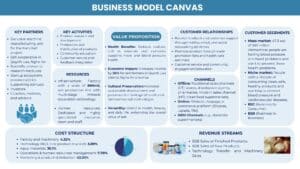
Economic value: With individual customers, people can easily access reduced-sodium salt products to help protect their health at reasonable prices through Nanosalt’s agents and e-commerce channels.
At our new BMC, we also focus on developing B2B products. Nanosalt provides raw salt products that meet industrial standards, serving a variety of industries at reasonable prices, helping manufacturing businesses in Vietnam access a stable source of input materials that meet required standards instead of depending on salt’s importation.
Social value: By providing mineral-rich sodium-reduced salt products, Nanosalt wants to join hands to protect the health of Vietnamese people, while creating sustainable livelihoods and increasing income for salt villagers. We are closely linked with salt cooperatives in Quynh Luu and purchase brine (a byproduct of the salt production process) from people at a price equal to half the price of raw salt. From there, Nanosalt can join hands to preserve the cultural heritage of traditional salt craft villages.
Capture value: We diversify our revenue sources from selling finished products to individual customers; providing finished products and raw salt to manufacturing enterprises; and exporting salt to international markets. In addition, we also have passive income from transferring salt production technology to businesses in the same industry.
A3. Growth potential
A3.1. The Potential of Target Market:
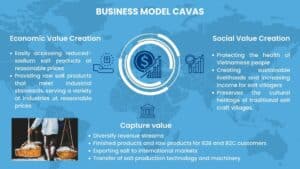
The global health and wellness foods market was valued at 825 billion dollars in 2022, and is estimated to grow at the rate of 45% to reach 1.5 billion 10 years later. This positive trend also includes Vietnam – the most potential SEA nation with a 13% CAGR. One of the main drivers for this change in the Healthy Food Market is due to the increase in the amount of Sodium Reduction Ingredients, with 11.71% CAGR of both nations.
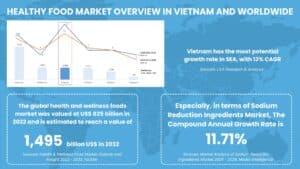
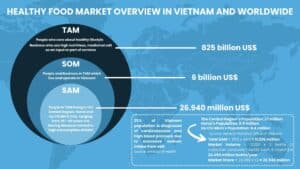
With NanoSalt’s customer yearly growth rate of 10%, all of them will be acquired from word of mouth in 2023. In 2024, we still mainly attract new customers through earned media of national competition, television, and newspapers, which does not cost NanoSalt any fee. However, in 2025, NanoSalt aims to utilize more of its marketing strategy through its own media of social platforms and run campaigns for a larger targeted audience.
NanoSalt’s leading KPI (By the end of 2025):
- 100 retailers nationally
- 15 hospitals and pharmacies collaboration
- 1.000.000 individual customers
Besides Marketing, in 2025, NanoSalt is also working on the partnerships with Trung Nguyen Legend Corporation, in terms of franchising our exclusive technologies in creating high-nutritious, low-sodium salts, with the aims of supporting the salt makers’ village in Hoa Vang, Da Nang – the hometown of Trung Nguyen Group’s President – Mr. Dang Le Nguyen Vu. Moreover, we are stimulating the charity activities, by using a part of NanoSalt’s revenue to assist charitable organizations.
Moreover, by 2026, we intend to expand our target audience to other countries with similar eating, dieting and self-conscious behaviors in APAC, with the expectation of a 100-120% leap in number of users by the end of the year.
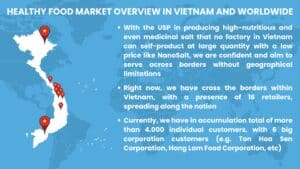
A3.2. The Significance of Target Issues:
A.3.2.1. The Scope of Social Issues:
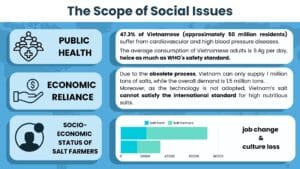
Firstly, public health. 47.3% of Vietnamese (equal to approximately 50 million residents) suffer from cardiovascular and high blood pressure diseases, and 25% of which is diagnosed with the reason of excessive sodium intake mainly contained in salt. Salt is the most used spice in every Vietnamese meal. Daily, the average consumption of Vietnamese adults is 9.4g per day, twice as much as WHO’s safety standard. All of them drive NanoSalt for further innovative solutions, which is our Low-Sodium Salt. Our salt cuts the amount of Sodium, but adds in other essential minerals such as Magie, and Kali, to balance and give out the same flavor as the ordinary one.
Secondly, the socio-economic status of salt farmers. In Vietnam, salt-making jobs cannot provide enough necessities for households, affecting the residents’ life quality, resulting in job change and culture loss. In 2011, Vietnam had approximately 50.000 salt makers with 21.000 hectares of salt farm, then up to 2023, it decreased by 50%, with 19.000 salt makers with only 13.500 hectares of salt farm. By monthly buying the input of salt and salt brine from the salt makers, NanoSalt assures a stable income for salt maker households and combines with other businesses and salt cooperatives through technology franchising, then preserving the traditional salt craft villages across Vietnam.
Thirdly, the economic reliance. Despite being one of the largest salt farms in the world, Vietnam heavily relies on salt importation. Due to the obsolete salt-making process, Vietnam’s salt cannot satisfy the international standard for highly nutritious salts, especially specified for Industrial and Medical purposes, driving the demand for salt importation of 500 thousand tons per year. This amount has caused much pressure on Vietnam’s fund as Vietnam spent billions of dollars per year for that. With NanoSalt innovation, we have now been able to self-produce the highly nutritious salt, relieving the dependence on importation. That billions of dollars can be relocated to invest in other infrastructures and projects, developing Vietnam as a whole.
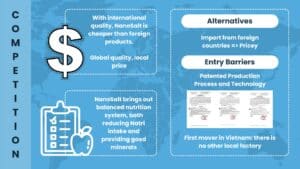
A.3.2.2. The Scope of Environmental Issues:
With the traditional methods of creating salt from saltwater, and salt lakes by local residents, salt making is gradually but adversely impacting the environment, especially in terms of the topography of the hometown, the size of land usable, the surface water, and the hydrology of the community around. Moreover, the obsolete process also creates the byproduct of salt brine, which usually is wasted away, leading to more severe environmental damages, such as a dried lake bed and new large ponds.
A3.3. Competition & Competitive Strategy:
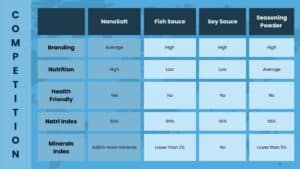
There is a booming trend in consuming domestic products that is promising to Vietnamese products since it is supported not only by citizens but also by the government. Moreover, compared to others, NanoSalt’s products are more suitable for Vietnamese’ income than foreign products. Nevertheless, on a functional basis, it is still as nutritious and healthy as foreign products, even balancing out some lacking essential minerals (such as Kali, and Magie). However, since NanoSalt is still a new product, it does not have a solid market share to compete with other big names. It is challenging for us to find a way to switch consumer behavior.
To tackle this situation, NanoSalt’s team has come up with some growth mechanisms to acquire more customers and enhance potential’ awareness:
- Marketing: Utilize owned media of social platforms and increase spending on marketing to widespread the products and attract them to try out NanoSalt.
- Releasing appropriate revenue stream: Collaborate with hospitals and pharmacies, emphasizing more on the medicinal aspect of NanoSalt and establishing reasonable revenue.
- Product: Create more flavor with high-nutritious salt products and diversify the use purposes for medicinal salt (broader it to solve more diseases and serve more types of customers).
- Learning and adaptation: Attend social competitions to expand our impact.
A3.4. Window of Opportunity & Timing Strategy:
The problem: The healthy food market is now expanding wider every year, especially the highly nutritious salt has gradually turned from “costly additional goods” to “daily spices”, opening the door for many competitors to enter with strong technical advancements to self-produce. We understand that if we do not popularize NanoSalt spontaneously acquire the market share, and familiarize the customers with our diversified product lines, we will soon be eliminated.
Business’s internal capabilities, resources, and readiness to capitalize on the opportunity: Throughout years inside the healthy food market and pioneer in locally produced high nutritious salt, we have developed intellectual capital (Strong product development team, partnerships with a national network of 39 retailers). It helps us in the process of widening both our market share and customers. Our financial state (with self-funding and prize money from competitions) also gives us opportunities to expand our business activities and expansion.
Timing of market entry: Since COVID-19, the health awareness of Vietnamese has increased strongly. Foreign brands have successfully educated the market about healthy and highly nutritious food and spices for healthy consumption. It does create a golden time for NanoSalt to expand its market share and imprint as the household name for healthy salt.
The Support from Governance Structure: After the alarming report on the excess sodium intake from the Ministry of Health, Vietnam’s government has enforced incentives for low-sodium product manufacturing corporations. This enables NanoSalt to step up the game and widen its market share, as many reputable Foods Manufacturing Corporations (such as Hong Lam Food Corp, and QP Food Corp) want to partner up to have access to our Sodium Salt. We are preparing full forces to take advantage of this chance to become the Top of Mind in the Low Sodium Products Market in Vietnam.
B. Resources and capabilities to execute
B1. Key capitals
B1.1. Human capital
Our team is composed of passionate and dedicated individuals who are committed to our noble mission: protecting public health and preserving the traditional salt villages of Vietnam. Các thành viên của Nanosalt:
- Founder: Mr. Ho Xuan Vinh, author of more than 30 inventions, including 3 patents for producing salt from brine. At the same time, Mr. Vinh is also in charge of Nanosalt’s research and development activities, ensuring the production line meets standards and researching new salt products to meet diverse market needs.
- Co-founder: Mrs. Tran Thi Hong Tham, a bachelor of foreign economics from FTU, is in charge of the Business Development activities of the enterprise. Mrs. Tham is a native of Quynh Luu, Nghe An, that’s why Mrs. Tham clearly understands the difficulties and hardships salt workers are facing and knows the traditional salt-making profession. Therefore, Ms. Tham has built a suitable working strategy with farmers to create mutual benefits. At the same time, Mrs. Visited Nanosalt representatives to convey Nanosalt’s story to partners: customers, investors, Government representatives, local authorities, ..
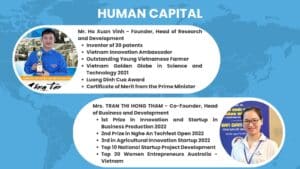
- Along with 3 members, Le Minh Ngoc – Sales Manager, Le Gia Bao – Marketing Executive, and Nguyen Khanh Linh – Business Analyst.
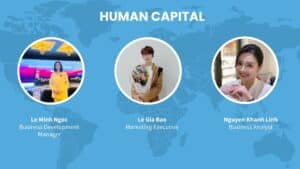
In addition, Nanosalt has 5 production employees at the factory in Nghe An and 10 employees at the office.

Each member is not only an expert in their field but also carries a deep love for their work and a strong sense of responsibility towards the community. Skills such as critical thinking, creativity, communication, and problem-solving are always focused on training by Nanosalt for employees. In addition, Nanosalt promotes an equal and fair working environment, promoting cooperation and teamwork among members at every stage in the value chain.
Accompanying the Nanosalt team are the coaches:
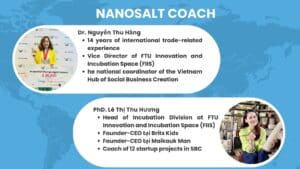
B1.2. Social capital
NanoSalt’s social capitals comprise of:
– Bonding social gap: Nanosalt currently has a factory in Quynh Luu, Nghe An, one of the best salt fields in Vietnam. We are closely linked with local salt cooperatives. We have currently signed purchasing contracts with 2 salt cooperatives in Quynh Luu, with 660 hectares of salt production. At the same time, we have activities to support people to create long-term, sustainable relationships.
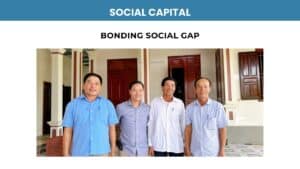
– Bridging Social Capital: Cooperate with media agencies to spread the value of Nanosalt to the community and reach potential customers.
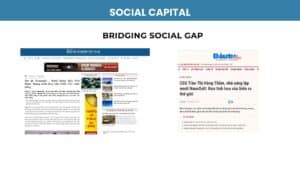
– Linking social gap: Nanosalt also has the companionship of Nghe An local government; educational institutions such as Phenika University (research on the effect of sodium-reducing salt), Innovation and Incubation Center of Foreign Trade University (SIP 100 program); international organizations such as UNDP (I see Covid program).
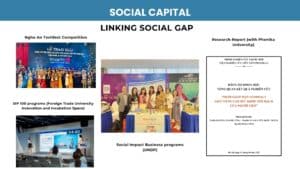
NanoSalt’s strategy to expand the range of social capital is to take part in social-oriented competitions, seeking partnerships and prestigious proof of our social impacts. Thus, it’s easier for next-stage collaboration with more local authorities other than Quynh Luu, supporting us to expand our mission of increasing both salt quality and their makers’ life quality to other traditional salt maker areas and seeking crowdfunding opportunities/investments.
B1.3. Intellectual capital
Intellectual capital has become a crucial asset for businesses, playing a pivotal role in their competitiveness and long-term prosperity. The intellectual capital of Nanosalt is:
- Innovative solution with exclusive technology along with 03 Intellectual Property Patents: Sea Salt Concentration Device” (application number VN 2-2022-00169), “Cold Crystallization Sea Salt Device” (application number VN 2-2022-00190), “Method for Producing Edible Salt from Seawater” (application number VN 2-2022-00191)
- Nanosalt trademark registration certificate:
– Certification of Science and Technology Business by Vietnam’s Department of Science and Technology, which will receive incentives from the government like tax incentives, preferential loan eligibility
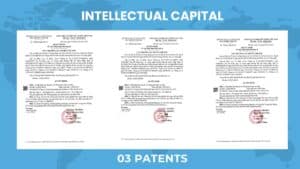
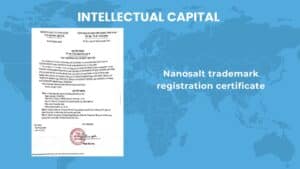

Strategies for maintenance and enhancement:
– Technology transfer of the process of making highly nutritious salt to other salt production facilities nationwide, collaborating to promote the development of Vietnam’s salt industry, increasing social impact.
– Continuously improve and research new salt products to meet the diverse needs of the market.
– Attending social and non-social business competitions to seek partnerships, and investments, and expand our social and business impacts.
– Attending a bilateral relations enhancement program between Vietnam and other countries: To seek opportunities for expansion to other potential markets.
B1.4. Manufactured capital
Nanosalt currently owns a NanoSalt salt factory with an area of 800m2, applying ISO 9001:2015 quality management standards and food hygiene and safety.
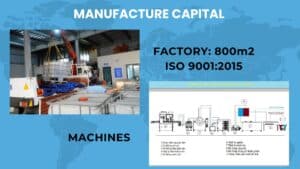
Demonstrated above is NanoSalt’s manufacturing capitals. Since our most important resources are tangible, including the factory and machine to produce the salt, NanoSalt always tries to optimize the manufactured capital so that the tools’ depreciation time will be optimized, and we can produce the most efficiently. These tools are 100% involved in our business expansion-oriented activities. In addition, we also have 03 patents and cooperate with 2 salt cooperatives to ensure an abundant supply of raw materials with 660 hectares of sand-dried salt production, thereby being able to supply to the market 400- 500 tons/year of quality salt products.
Strategies for maintenance and enhancement:
By showcasing the potential growth pace of our product, we will collaborate with cloud server and AI model providers to not only integrate AI into the process of creating salt products, but also into optimizing our internal business activities for resource management, administrative tasks, and apply data analysis tools to manage the business.
B1.5. Financial capital
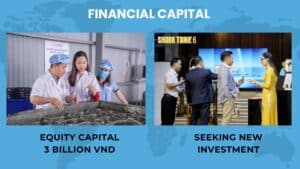
In the first stage, NanoSalt mainly self-funds for its facilities and machines, with Equity Capital of 3 billion VND (120,000 USD) from the founders. Our main financial needs refer to RnD, including new product research, development with the current product, and enhancement with the current production, all of which help us to sustain our business and expansion.
Strategy for maintenance and enhancement:
Besides 100% equity capital, focusing on RnD also gives NanoSalt opportunities for new investments. Apart from the prize money achieved from numerous startup competitions, our team is seeking new investors as we have plans for crowdfunding and fundraising. From the profit we have gained, besides R&D, we are also focusing on adapting AI into the process, which also grants NanoSalt advantages to attract investors and better solve the customers’ problems.
We also attend social and non-social business conferences, incubators, and product introductions to seek investors, stakeholders, partnerships, and more chances for expansion.
B2. Business traction
Nanosalt provides salt products to serve individual and business customers. We have started launching products on the market since March 2022, after 5 years of thorough research.
For individual customers, we provide a variety of salt products including health salt lines such as seasoning salt, and dipping salt, which can be used in daily meals, and beauty salt lines such as foot bath salt, and bath salt, … can be used in health care, beauty, and at spas. Individual customers can order directly through Nanosalt, or through the e-commerce platform Shopee, Tiki, Lazada, and Nanosalt’s website, or buy directly at Nanosalt’s 39 distribution agents nationwide.
According to statistics from 2022 to the present, the number of individual customers who have used Nanosalt products is:
Nanosalt’s salt products are designed to serve the needs of all family members. On average, a Vietnamese household has 3.6 people/household. Thus, the number of people benefiting from Nanosalt products is:
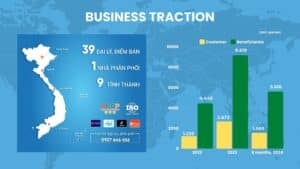
For business customers, we provide standard raw salt to serve many industries at reasonable prices. Our typical corporate customers include:
- Trường Food Company
- Hong Lam Joint Stock Company
- Hoa Sen Steel Company
- QP Food Company
- Vascom Vietnam Algae Company
- Ho Hoan Cau Co., Ltd.
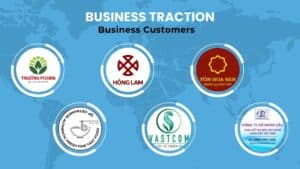
Within nearly 2 years of launch, Nanosalt has seen strong growth in the number of customers and revenue, showing that Nanosalt products have been well received by the community

Nanosalt has also approached a number of international markets such as Korea and Canada; partners have visited the factory and offered to cooperate with Nanosalt
With a huge domestic and international market capacity, Nanosalt still has a lot of room to develop. In the near future, we will focus more on the B2B customer segment: supplying raw salt to food, beverage, pharmaceutical, and cosmetic processing businesses in Vietnam, aiming to transfer Separation technology. Epsom sea minerals to domestic and foreign salt production areas in the form of technology franchise, and at the same time exporting health salt to the Japanese and Korean markets (2 potential markets). At the same time, we also research new products to meet customer needs such as medicinal hot compress sets.

B3. Risk management
For the risks NanoSalt may face, our team has thoroughly analyzed and planned the mitigation solution for each as below:
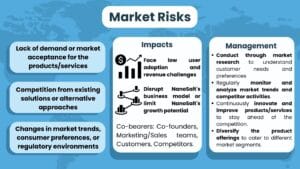
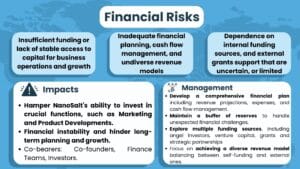
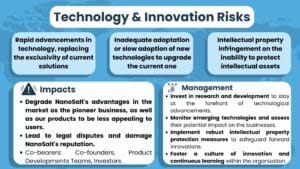
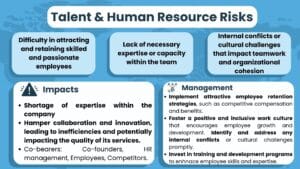
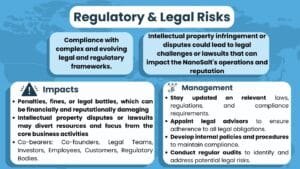
C. ESG performance
C1. Overall impacts on the society and environment
C1.1. Possible ESG risks:
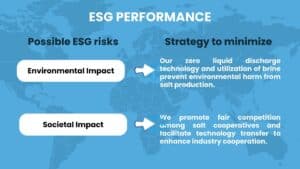
Polluting the environment around the factory and salt production areas
Strategy to minimize negative externalities: Salt production can pollute the soil and water environment; Some salt product factories can also cause air pollution. To avoid this situation from happening when the Nanosalt project is put into operation, Nanosalt has researched a production process that is completely powered by heat so there is no liquid waste and air pollution. When sea water is hot or cold, the water will evaporate so it does not cause harm to the environment. The input material of the process is also brine – a by-product of the salt-making process. Previously, it was not used by people and was only discharged directly into the environment, leading to saline water. For factory waste, Nanosalt collects according to general regulations in the area, ensuring food hygiene and safety and green space in the working area.
Causing competition among salt-making cooperatives in Quynh Luu district, and competition in the salt production industry in general
Strategy to minimize negative externalities:
When implementing the Nanosalt project, we predict that competition between salt cooperatives in the Quynh Luu district will occur because Nanosalt purchases molasses at a price equal to half the price of raw salt. Therefore, we implement our purchasing policy through intermediaries. These focal points will replace Nanosalt in working with farmers and publicizing salt and molasses purchasing requirements, thereby creating fairness and transparency in purchasing.
In addition, to limit competition between salt producers in the industry, Nanosalt has implemented a production technology transfer mechanism to increase cooperation with salt producers across the country, which increases social impact, creating more sustainable livelihoods for salt workers.
Recently, Trung Nguyen Coffee – one of the largest coffee producers in Vietnam visited Nanosalt’s factory and proposed to transfer Nanosalt’s salt production technology to the salt-making area in Khanh Hoa, Nha Trang, Mr. Vu – founder of Trung Nguyen hometown, with the aim of supporting people, creating livelihoods and preserving salt villages in Khanh Hoa.
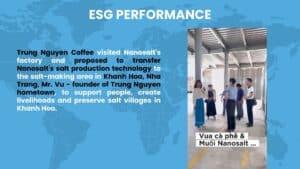
C1.2. ESG Framework application
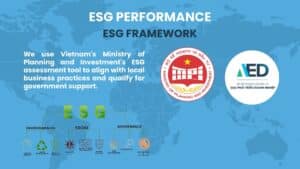
Nanosalt is also researching and implementing the application of ESG standards by 2025, contributing to building a sustainable development strategy, and predicting risks while increasing corporate reputation and attracting investors.
Nanosalt is currently a small-scale business, so using popular ESG assessments such as the Global Reporting Initiative (GRI), and the Sustainability Accounting Standards Board (SASB), … will cause difficulties and complications for businesses during the information-gathering and evaluation process. Therefore, to measure ESG indicators, Nanosalt chooses to use the Tool to assess the level of sustainable business practices according to the Environmental – Social – Governance (ESG) assessment framework issued by the Department of Enterprise Development – Ministry of Planning and Investment of Vietnam (AED – MPI) elaborated.
This toolkit is referenced by AED experts from the IFC ESG Guidebook and The GRI Perspective – ESG standards, frameworks, and everything in between. The criteria are included in this ESG Assessment Tool at a basic level, consistent with the level of development of the Vietnamese business community, of which 90% are small and medium-sized enterprises, and at the same time provide businesses with the most basic understanding of ESG practices in businesses, from which, businesses may be more willing to practice according to ESG assessment frameworks with a higher level of depth and criteria that investors and markets may require.
In addition, the Vietnamese government has issued Decision No. 167/QD-TTg on the Program to support private sector enterprises for sustainable business in the period 2022 – 2025. By participating in using this toolkit, Nanosalt can be selected to participate in Government support programs, this is a stepping stone to help Nanosalt scale up, and receive financial support and training programs. from the Government of Vietnam; At the same time, spreading Nanosalt’s values closer to the community.

C2. GOVERNANCE STRUCTURE
Nanosalt’s corporate governance strategy ensures:
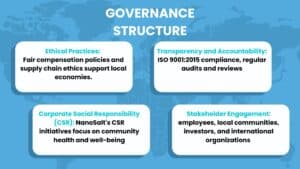
- Ethical Practices: We adhere to strict ethical guidelines in all business operations, ensuring fair treatment of employees, suppliers, and customers. For employees, we always ensure fair compensation policies, regardless of gender, with female employees with children having flexible working hours when necessary. Our commitment to ethical practices extends to our supply chain, where we encourage low-income people to participate in Nanosalt’s value chain. We purchase salt residue from local farmers at 50% of the raw salt price with public quality criteria, thereby increasing their income and supporting the local economy. In addition, we have a mechanism to encourage mothers to register to become Nanosalt distributors with attractive profit sharing rates.
- Transparency: We maintain transparency in our operations by regularly publishing detailed reports on our production processes compliance with ISO 9001;2015 standards, and financial performance. These reports are accessible to all stakeholders, ensuring that our actions and decisions are clear and open to scrutiny. We are always ready to call on investors to join Nanosalt to promote development. Recently, Nanosalt participated in Shark Tank – one of Vietnam’s famous investment capital programs to seek cooperation opportunities with investors.
- Accountability: Our governance structure includes regular audits and reviews to ensure compliance with legal and regulatory requirements. We hold ourselves accountable through internal and external audits, which help us identify and address any areas of improvement.
- Sustainable Economic Development: By implementing advanced separation technology in salt production, we enhance the efficiency and quality of our products, such as our reduced sodium salt, which is beneficial for health. This technological advancement not only supports sustainable production but also helps us connect with farmers in our value chain, promoting inclusive economic growth.
- Stakeholder Engagement: We actively engage with our stakeholders, including employees, local communities, investors, and international organizations to understand their needs and concerns, and spread the value of Nanosalt. This engagement helps us make informed decisions that benefit all parties and contribute to the well-being of society.
- Corporate Social Responsibility (CSR): Our CSR initiatives focus on improving the livelihoods of local communities and promoting health and wellness through our products. By offering reduced sodium salt, we contribute to better health outcomes for our customers, aligning our business goals with societal well-being. We also regularly carry out charity activities to support the community and enhance Nanosalt’s reputation
Based on such governance principles, we hope to address SDGs 1,3,5,8,13. These mechanisms help us collect information and evaluate businesses based on the ESG assessment toolkit developed by AED. We also work closely with partners to spread the value of Nanosalt to the community, attract more customers, ensure sustainable development of the business and scale up Nanosalt’s social impact.
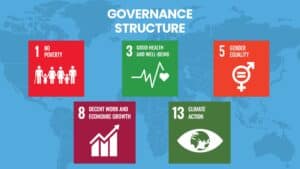
D. LEARNING CURVE:
Lesson learned about Success:
- NanoSalt has effectively familiarized the NanoSalt’s consumption experience for customers by creating the same flavor but using healthier ingredients and advanced technology.
- This “same taste – but healthier” product development was successfully implemented as a result of NanoSalt’s application of SBC’s training courses in identifying the customers’ problems, then going on to further develop the solution.
- NanoSalt’s success has been largely driven by word-of-mouth marketing, which has helped the company reach a large audience with nearly zero marketing costs.
- Moreover, with the help of global competition as SBC through training courses, NanoSalt now knows how to grab the chance to connect with professional mentors in various fields, and also knows how to best partner up with prestigious corporations.
- This word-of-mouth marketing and partnerships have helped to reinforce the credibility and authenticity of NanoSalt’s products.
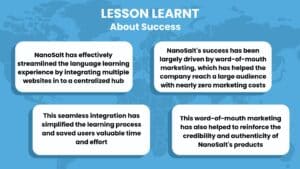
Lesson learnt about: Pioneer and Improve:
NanoSalt has experimented with creating 2 main lines of salt: “same flavor – healthier” salt for health improvement in daily consumption and medicinal salt for specific treatment purposes, by implementing exclusively patented technology. We interviewed in-depth with both rural and urban housewives, as well as patients and doctors to gather opinions, then developed the products, and tested the products in real life. The results showed a significant increase in B2C customer amount, only by the first 6 months of 2024, we have surpassed 101% compared to 2022 (1560 customers compared to 1235). For B2B, NanoSalt is now having contracts with 06 big corporations, with representatives such as Ton Hoa Sen Corporation or Hong Lam Corporation. creating momentum. We will continue to innovate and explore different ways to apply our technology in order to further increase revenue growth.
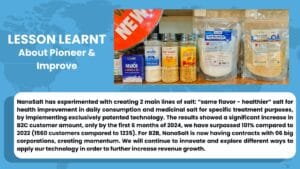
NanoSalt isn’t just about salt. It’s a solution to health and environmental sustainability. Together, let’s redefine the future of salt production, making healthier choices accessible to all.


